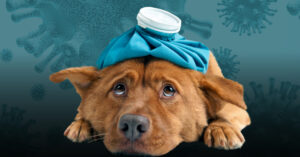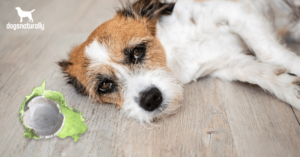Dealing with puppy diarrhea can be a stressful experience for any pet owner. It’s a common problem, but understanding its causes and how to manage it at home using natural remedies can provide both relief and peace of mind.
Let’s explore the various factors that can lead to puppy diarrhea, from dietary mishaps to more serious health concerns. Then we’ll dive into a range of natural solutions that you can easily implement at home. These remedies are not only gentle on your puppy’s system but also effective in providing comfort and promoting recovery.
Understanding Puppy Diarrhea
Puppy diarrhea typically occurs when there’s a disruption in the normal function of the small or large intestine. The small intestine is the primary site of nutrient absorption, so any disturbance such as an infection, dietary intolerance, or other irritants can impede the absorption process. Instead of nutrients and fluids being absorbed effectively, they pass through rapidly, resulting in the watery stools that are characteristic of diarrhea.
The large intestine absorbs water from any waste material. When it becomes inflamed or irritated due to factors like stress, infections, or parasites, its ability to reabsorb water diminishes, contributing further to diarrhea. Let’s take a look at how this can happen.
Common Symptoms Of Diarrhea
When your puppy has diarrhea, here are the common things you might notice:
- Watery Stools: First and foremost, you’ll notice the poop is a lot more liquid than usual. This is the hallmark of diarrhea and the most obvious sign that your puppy’s digestive system is out of sorts.
- More Bathroom Breaks: Your puppy might be asking to go outside more often.
- Greater Urgency: They might seem desperate to go, like it’s a real emergency.
- Color Changes: Keep an eye on the color of their stool. Diarrhea in your puppy might be yellow, green, or even black.
- Blood or Mucus: A bit unsettling, but sometimes there’s blood or mucus. Blood is a sign that the intestines are irritated.
- Vomiting: Unfortunately, sometimes things go wrong at both ends. Vomiting along with diarrhea means puppy’s entire digestive system is upset.
- Lethargy: If your usually playful puppy is more into napping than playing, that’s a red flag.
- Skipping Meals: A loss of appetite can accompany puppy diarrhea, but not usually.
- Weight Loss: If your puppy isn’t digesting food well, she may start to lose weight.
- Dehydration Signs: Dry gums or skin that doesn’t snap back quickly when you pinch it lightly are signs that puppy needs more fluids.
While most cases of puppy diarrhea aren’t all that serious, keep a close eye on these symptoms. If puppy shows these signs for more than a day or just seems really off, it might be time to talk to your vet.
Common Causes Of Diarrhea In Puppies
There are many causes of puppy diarrhea and they can often be different than adult dog diarrhea. Here are the most common causes you should be aware of:
- Stress-Induced Diarrhea: The transition from a puppy’s birth environment to a new home can be a stressful experience. This significant change often triggers stress hormones that upset the gastrointestinal system. Inflammation in the colon due to stress can impede water absorption, which can cause stress diarrhea in dogs. Additionally, excessive play and excitement might sometimes result in diarrhea.
- Dietary Changes: Puppies undergo several dietary transitions early in life, from weaning off mother’s milk to adapting to a breeder’s diet, followed by another switch upon arriving at their new home. These frequent changes can be challenging for a puppy’s digestive system. However, puppies introduced to a varied diet during weaning generally adapt more easily to new foods. Puppies also tend to explore with their mouths, leading to ingestion of inappropriate items like plants or inedible objects, which can cause food poisoning or digestive disturbances. These cases of diarrhea typically resolve within a couple of days.
- Veterinary Treatments: Common procedures like vaccinations, deworming, or other medications received during initial vet visits can disrupt a puppy’s gut flora, leading to digestive upsets. Diarrhea is a common side effect of these treatments, especially diarrhea after antibiotics.
- Parasites: Puppies, with their developing immune systems, are more vulnerable to parasites such as worms, giardia, or coccidia. Natural treatment options are available to address these parasites without relying on harsh medications.
- Parvovirus Infection: Parvovirus is a serious viral illness that commonly affects puppies between 6and 20 weeks of age. One of the first symptoms is often diarrhea, typically bloody with a distinct metallic odor. Other symptoms include vomiting, fever, lethargy, and loss of appetite. Prompt action, including veterinary testing of a fecal sample, is crucial if parvovirus is suspected.
When Is Diarrhea a Concern?
Puppy diarrhea can be a normal response to various changes, like a new diet or mild stress. However, there are certain red flags that signal it’s time to take action:
- Duration Matters: If the diarrhea persists beyond a couple of days, it’s a sign that something more serious might be at play. Prolonged diarrhea can lead to dehydration and nutrient loss.
- Blood in the Stool: The appearance of blood in puppy diarrhea is a good indicator that the digestive system is highly irritated or injured and it can be a sign of parvovirus. It’s definitely a situation where you should seek veterinary advice.
- Vomiting: When diarrhea is accompanied by vomiting, it raises concerns about puppy’s overall ability to stay hydrated. This combination can quickly lead to dehydration, especially in a very young or small puppy.
- Lethargy and Weakness: If your normally playful and energetic puppy suddenly seems tired, weak, or uninterested in their usual activities, it’s a sign that they’re not coping well with the diarrhea.
- Change in Appetite: Refusing food or a noticeable decrease in appetite is another indicator that your puppy’s health needs attention.
- Signs of Dehydration: Dehydration can be a serious concern with diarrhea. Look for dry gums or sunken eyes. Pinch the skin on your puppy’s neck: it should bounce back immediately in a hydrated puppy.
Natural Remedies for Puppies with Diarrhea
Most cases of diarrhea will usually clear up in a day or two without help, but it’s best to start treating your puppy right away to avoid dehydration. Here are some simple ways to manage vomiting and diarrhea in puppies at home:
- Change the Diet: When dealing with puppy diarrhea, a bland diet is a good idea. Offering easily digestible food, such as boiled chicken mashed to a soft consistency, can provide the digestive system with much-needed respite. This diet is not only soothing but may also enhance the absorption of nutrients. While fasting can help adult dogs recover from diarrhea, it’s best to check with your vet before fasting puppies.
- Feed Fiber: Increasing the fiber content in your puppy’s diet can help build stool volume and move water out of the intestines. Gradually adding plain pumpkin (not the pie filling variety) in small amounts can help absorb excess water in the intestines, promoting firmer stools.
- Give Probiotics: Probiotics can help rebalance gut flora and soothe an inflamed gut lining. You can choose natural probiotics such as fermented vegetables, but only in puppies used to eating veggies. In most cases probiotic supplements are the best choice for puppies.
- Keep Puppy Hydrated: Maintaining proper hydration is critical in managing diarrhea in puppies. Beyond ensuring ample water intake, providing nutrient-rich bone broth can offer additional nourishment during recovery and restore lost electrolytes.
- Slowly Transition Back to Regular Diet: As your puppy begins to recover, the reintroduction of solid food should be gradual. This helps avoid setbacks.
When to Seek Professional Help
Most cases of diarrhea in puppies will resolve quickly using simple, natural remedies. But many serious health issues can cause diarrhea, so it’s important to recognize the signs of more complex causes of diarrhea in your puppy.
Recognizing Severe Cases of Diarrhea
It’s important to recognize when puppy diarrhea turns from a minor issue into a serious concern. If your puppy’s diarrhea persists beyond a day or two, or seems to be worsening, it’s time to consult your veterinarian. Here’s what to look out for:
- Bloody Diarrhea: This, along with the symptoms of parvovirus I mentioned earlier, is a red flag.
- Appetite Changes: A noticeable decrease in eating or a complete loss of appetite is concerning.
- Inadequate Water Intake: Not drinking enough water can quickly lead to dehydration.
- Gum Color and Texture: Pale, dry, or tacky gums are signs of serious health issues.
- Vomiting: When coupled with diarrhea, it can escalate the risk of dehydration.
- Changes in Urination: Reduced or absent urination is a sign of dehydration.
- Dark, Tarry Stools: This can indicate internal bleeding.
- Behavioral Changes: Any change in your puppy’s usual disposition warrants attention.
- Lethargy or Weakness: A lack of energy or weakness is a clear sign something is wrong.
- Pain Indicators: Whining, obvious discomfort, or reluctance to move can indicate pain.
- Duration of Diarrhea: Diarrhea that doesn’t resolve in a day or two or worsens needs veterinary attention.
- Possible Ingestion of Harmful Substances: If there’s any chance your puppy has ingested something toxic or indigestible, immediate veterinary care is essential.
Understanding these signs and acting promptly can make all the difference in your puppy’s health. While natural remedies work well, prolonged or severe diarrhea will need your vet’s help.
Frequently Asked Questions (FAQs) about Puppy Diarrhea
Why does my puppy have diarrhea but is acting normal?
Diarrhea can often be a minor response to new foods, a change in diet or getting into garbage. If puppy is acting normal and the diarrhea doesn’t last more than a day or two, there’s typically nothing to worry about. Just closely monitor your puppy for signs of bloody diarrhea, vomiting or appetite changes.
What should I feed a puppy with diarrhea?
When addressing diarrhea in puppies, easily digestible foods are key to limiting gut irritation. Feed your puppy some boiled chicken and mash it together with fresh, canned or powdered pumpkin. Just be sure any canned pumpkin doesn’t contain any other ingredients, which may cause more digestive distress.
What does parvo poop look like?
Parvovirus, a serious viral infection in dogs, often results in very distinctive feces. Typically, parvo poop can be characterized by its unusually foul, often metallic smell. It’s commonly very liquid and bloody, indicating severe irritation and bleeding in the gastrointestinal tract. The color may range from a deep red to a more brownish hue, mixed with blood. If you see these symptoms in your puppy’s stool, immediate veterinary attention is needed. Parvo is a severe condition, and early intervention can be critical for your puppy’s health.
Can puppy teething cause diarrhea?
While teething itself typically doesn’t directly cause diarrhea, the behaviors associated with it might. Puppies tend to chew on various objects to relieve teething discomfort, which can result in them swallowing non-food items or bacteria that upset their stomachs, leading to diarrhea.













